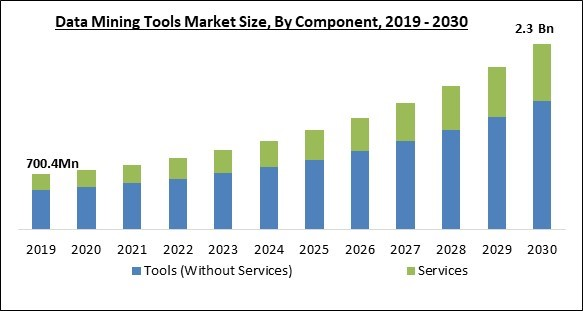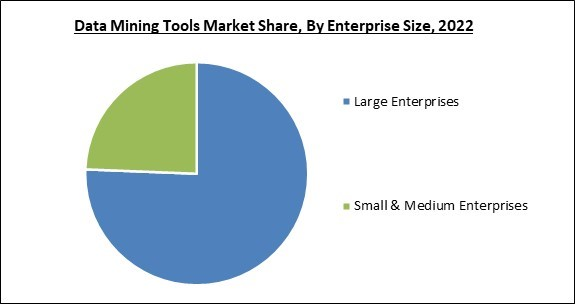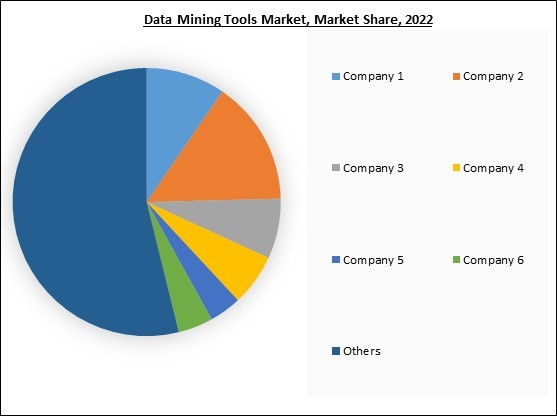Data mining tools analyze network performance data, identifying bottlenecks, congestion points, and areas that require optimization. Therefore, the Telecom & IT segment will capture 1/5thshare in the market by 2030. The sector can use these tools to comprehend the evolving patterns of the collected data in order to make well-informed decisions regarding its various business operations. This is a result of the rapid growth of data mining tools to analyze the growing quantity of digital data. This helps telecom companies ensure optimal network performance, reduce downtime, and enhance customer satisfaction. Some of the factors impacting the market are increasing integration of data mining and machine learning, rising digitization and data production, and privacy issues with data mining.
Industry is drastically changing all over the world as a result of the quick development of futuristic technologies. Logistics and transportation are one of these sectors. After emerging technologies like data mining, telematics, machine learning (ML), and artificial intelligence (AI), several senior executives predicted a technological transition in the transportation and logistics industry. The fleet management industry can detect fleet collisions and prevent delays with greater accuracy due to implementing ML technology. ML algorithms expand the potential of data mining by managing enormous datasets, automating complex tasks, and spotting detailed patterns. Furthermore, the development of digital data has grown significantly during the last few decades. The increased usage of digital devices, such as smartphones and computers, in everyday life is one of the major factors contributing to this increase in digital data generation. Additionally, the Internet of Things (IoT) is becoming increasingly popular, and the data produced by many IoT devices has also contributed to the data explosion. Data mining must be used to sift through these vast quantities of data to identify trends that can assist companies in making better decisions in various areas. Thus, the use of machine learning and as more organizations add big data tools and analysis solutions to their infrastructure, the market is also likely to expand.
However, data mining techniques could lead to security issues, a major concern as development has grown. According to several security specialists, data mining will be one of the most significant obstacles consumers will face in the next decade. Building precise models for data analysis without granting permission to utilize the information in specific customer records is the data mining process's greatest challenge since it prevents the database from being used improperly. Security issues are one of the most frequently raised concerns because people typically work with enormous amounts of information while utilizing data mining and have easy access to it. These security concerns with data mining may hamper the market expansion.
Enterprise Size Outlook
On the basis of enterprise size, the market is fragmented into large enterprises and small & medium enterprises. In 2022, the large enterprises segment witnessed the largest revenue share in the market. These enterprises need to rapidly analyze vast amounts of data from multiple locations to formulate business strategies. Large enterprises' IT spending capacity is strong, so their adoption of data analysis tools is increasing.Component Outlook
Based on component, the market is bifurcated into tools (without services) and services. In 2022, the tools (without services) segment procured the largest revenue share in the market. Data mining tools streamline the process of collecting, cleaning, and preparing data for analysis. This efficiency saves time and reduces manual data handling errors. Using data mining tools directly can be more cost-effective than engaging in external data mining services.Application Outlook
On the basis of application, the market is divided into marketing, supply chain & procurement, intrusion detection, business transaction, and others. The intrusion detection segment procured a promising growth rate in the market in 2022. The growth of the segment is owed to the rising risk of data theft. As enterprises retain vital business and consumer data, it is essential to protect them using a variety of methods. Data mining tools can identify any anomalous patterns and send an alert immediately.The leading players in the market are competing with diverse innovative offerings to remain competitive in the market. The above illustration shows the percentage of revenue shared by some of the leading companies in the market. The leading players of the market are adopting various strategies in order to cater demand coming from the different industries. The key developmental strategies in the market are Acquisitions, and Partnerships & Collaborations.
Deployment Type Outlook
By deployment type, the market is segmented into on-premise and cloud. The cloud segment covered a considerable revenue share in the market in 2022. Considering the limited IT funds and expanding network of small and medium-sized enterprises, key market participants are offering open-source cloud-based tools. The escalating usage of modern data analysis tools also pushes enterprises towards secure, cost-effective, cloud-based tools. Cloud offers its users or clients access to shared resources, software, and applications.End-use Outlook
Based on End-use, the market is categorized into BFSI, healthcare & life sciences, retail, IT & telecom, manufacturing, education, and others. The healthcare and life sciences segment recorded a remarkable revenue share in the market in 2022. The tools can assist healthcare systems with managing the supply chain and procuring medications and medical instruments. The insights can also greatly assist in evaluating pattern-based diseases and their underlying causes in emergencies, such as the COVID-19 pandemic.Regional Outlook
Region-wise, the market is analyzed across North America, Europe, Asia Pacific, and LAMEA. In 2022, the North America region led the market by generating the highest revenue share. It is due to the emergence of cutting-edge technologies like artificial intelligence, machine learning, the Internet of Things, and more. Industries throughout the world generate vast quantities of data. The demand for data analysis and pattern recognition has increased substantially. Due to its early embrace of new technologies and access to various data sources, the US and Canada are expected to dominate the regional market during the projection period.The market research report covers the analysis of key stakeholders of the market. Key companies profiled in the report include Oracle Corporation, IBM corporation, KNIME AG, Altair Engineering, Inc. (IMG Companies, LLC), Microsoft Corporation, Sisense, Inc., Google, LLC (Kaggle Inc.), SAS Institute, Inc., SAP SE and Teradata Corporation.
Scope of the Study
By Component
- Tools (Without Services)
- Services
By Application
- Supply Chain & Procurement
- Marketing
- Business Transaction
- Intrusion Detection
- Others
By Enterprise Size
- Large Enterprises
- Small & Medium Enterprises
By Deployment Type
- On premise
- Cloud
By End-use
- Telecom & IT
- BFSI
- Manufacturing
- Healthcare & Lifesciences
- Retail
- Education
- Others
By Geography
- North America
- US
- Canada
- Mexico
- Rest of North America
- Europe
- Germany
- UK
- France
- Russia
- Spain
- Italy
- Rest of Europe
- Asia Pacific
- China
- Japan
- India
- South Korea
- Singapore
- Malaysia
- Rest of Asia Pacific
- LAMEA
- Brazil
- Argentina
- UAE
- Saudi Arabia
- South Africa
- Nigeria
- Rest of LAMEA
Key Market Players
List of Companies Profiled in the Report:
- Oracle Corporation
- IBM corporation
- KNIME AG
- Altair Engineering, Inc. (IMG Companies, LLC)
- Microsoft Corporation
- Sisense, Inc.
- Google, LLC (Kaggle Inc.)
- SAS Institute, Inc.
- SAP SE
- Teradata Corporation
Unique Offerings
- Exhaustive coverage
- The highest number of Market tables and figures
- Subscription-based model available
- Guaranteed best price
- Assured post sales research support with 10% customization free
Table of Contents
Companies Mentioned
- Oracle Corporation
- IBM corporation
- KNIME AG
- Altair Engineering, Inc. (IMG Companies, LLC)
- Microsoft Corporation
- Sisense, Inc.
- Google, LLC (Kaggle Inc.)
- SAS Institute, Inc.
- SAP SE
- Teradata Corporation











